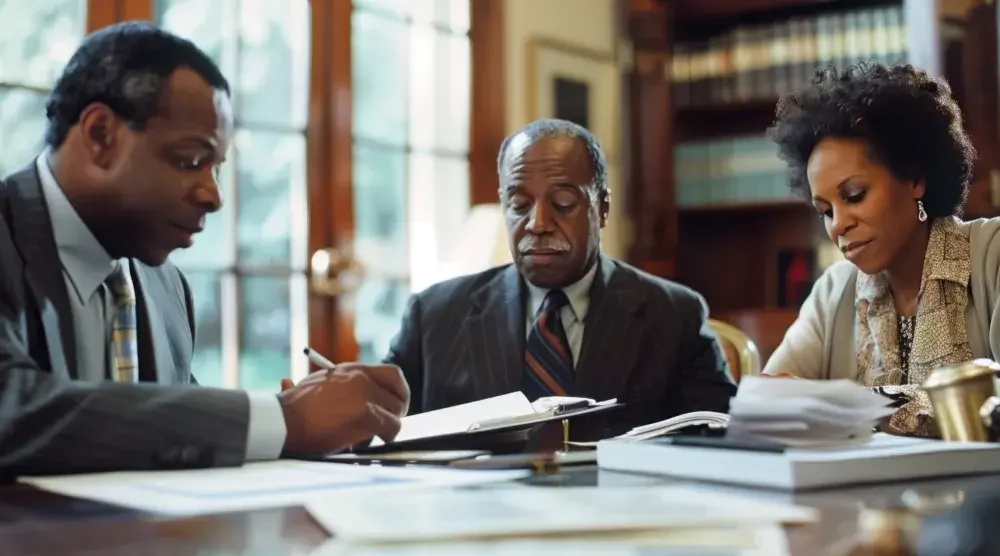Florida offers quick, uncontested divorces for those who have no minor children and aren’t seeking alimony–factors that are true for many of Florida’s older residents.
The state officially calls it Simplified Dissolution of Marriage. After filing the necessary paperwork, it takes less than 30 days to receive the decree. There are some other qualifying steps in this divorce process, but mostly, all that is required is that both halves of the couple agree to the terms of the uncontested divorce. Here's how it compares to divorce in other states.
Couples in Florida with minor dependent children or children who are older but still dependent can still get an uncontested Florida divorce, but they can’t use the simplified process.
Requirements for a Florida uncontested divorce
- Residency requirements: At least one spouse must have been a Florida resident for six months prior to filing, and that person must have lived in the county where they are filing for at least 90 days.
- Agreement on the grounds for a Florida uncontested divorce: Florida is a “no-fault” divorce state, so you don’t have to prove that one of you did something wrong. The state will simply ask you to say that your marriage is “irretrievably broken.” You also can file on the grounds of mental incapacity, but both medical and legal expertise will be required.
- Agree on the terms: Both spouses must agree on the terms of the uncontested divorce in Florida and how you’ll handle the important financial issues. Both spouses must give up the right to a trial and legal rights to appeal. To get a Florida simplified, uncontested divorce, you and your spouse can’t have any children under 18 or children who are older but still dependent. Neither person can be pregnant. In a simplified, uncontested divorce, you cannot seek alimony or other spousal support.
How to file for an uncontested Florida divorce
Below are the steps that you need to take in the uncontested Florida divorce process. This differs from a contested divorce.
Step 1: Consult a divorce attorney
While it isn't absolutely necessary to hire a divorce attorney, it is always a good idea. A simplified, uncontested divorce in Florida is designed to be manageable without a lawyer, but an uncontested divorce, especially with children, is complex. Hiring an attorney is essential.
Step 2: Resolve key issues in your uncontested divorce in Florida
Sit down and talk. You must decide on a plan for property division and how any debts will be paid. If there are children involved, you must address support, custody, and visitation.
Step 3: Prepare the forms
The required forms are provided by the state of Florida for filing a simplified, uncontested dissolution of marriage with no children or property. One spouse (the “petitioner”) files the request for a simplified divorce, and the other spouse (the “respondent”) has 20 days to file an answer. To help things move along smoothly, the respondent should simultaneously file the “Answer, Waiver, and Request for Copy of Judgment.” This tells the court that both parties agree to the terms of the divorce petition and want the uncontested divorce process to move forward as quickly as possible.
Couples in Florida with minor dependent children or children who are older but still dependent can get an uncontested Florida divorce, but they can’t use the simplified process. There are many considerations and legal reasons that require complete agreement and the filing of appropriate forms. These can include:
- How will joint property and other assets be divided?
- How will retirement accounts and other investments be valued and divided?
- Will one spouse require help from the other, and will that include alimony?
- What will be the parenting plan for minor children, and how will child custody be split?
- What are the financial responsibilities of each parent, including how much child support will each pay and who will provide health insurance?
- What will the visitation schedule be?
- Both parents with minor children who divorce in Florida typically must attend a parenting class within 45 days of filing the petition. The goal is to help them develop a parenting plan and other time-sharing details so the best interests of all children are considered.
Step 4: File the petition for the uncontested divorce in Florida
An instruction form will help you start the process of filing for an uncontested divorce when you have minor children, and it will point you toward other steps you need to take.
You can file these documents using the state’s e-filing portal or directly with the Clerk of Courts in your county. If getting to the county offices is easy for you, filing directly with your county is simpler and faster than using the portal. While you can’t get legal advice at your county clerk’s office, most will give you some procedural help if you need it.
Finding an attorney who will take care of these details is a wise move, and LegalZoom can help. Even spouses who agree on the terms of their split will find filing drawn out and time consuming–even tricky—when they have children and must consider issues related to support and custody.
Step 5: Serve the spouse
If you are using the simplified dissolution process in Florida, you don’t need to serve either spouse with divorce papers. The spouses fill out the forms together.
If you and your spouse work together to fill out all the required documents and other divorce paperwork, including financial affidavits, you can avoid the cost of serving the spouse who isn’t filing by asking that person to sign and file a Waiver of Service of Process.
Otherwise, to arrange for service, contact the sheriff's department, hire a private process server. If you can't locate your spouse, Florida allows for "constructive service." You take out an ad in a newspaper that accepts legal advertising.
Step 6: Finalize the uncontested divorce in Florida
When the court has received all the paperwork for your uncontested divorce in Florida, both people must appear in court for a final hearing. This appearance confirms to the court that both you and your spouse agree to the terms.
Step 7: Receive your divorce decree
If everything is in order, a judge will sign the Final Judgment of Dissolution at the hearing. Both parties will receive a certified copy of the final judgment. If one spouse doesn't show, the judge will accept the terms in the agreement and grant a default divorce. Either way, you’ll be officially divorced under Florida law.
How can a divorce attorney help me with a Florida uncontested divorce?
While involving a divorce lawyer isn’t required, it can make the legal process go more smoothly and help ensure all the steps have been taken correctly.
Here's how a good lawyer can assist:
- Ensure compliance and accuracy. Once you file, there are some things you can’t easily change, so getting it right the first time is important. Your attorney will ensure that paperwork is filed accurately and on time so there won't be unnecessary delays in the process.
- Mediating and negotiating. Divorce is thorny but experienced divorce attorneys have heard all the problems and know most of the solutions. They can mediate arguments and help you come to amicable agreements on tough issues.
- Providing advice and protecting interests. Experienced family law attorneys will educate you on your rights and help you work out equitable solutions, especially in areas of custody and support.
- Handling court appearances. While you can't pick the judge who will hear your case, an attorney with insight into the system will know how judges have ruled on cases similar to yours and help you adjust your strategy.
FAQs
How much does an uncontested divorce in Florida cost?
A simplified, uncontested divorce in Florida costs about $400 if you complete the paperwork yourself and file without using an attorney. Expect to pay $3,000 to $5,000 for an uncontested divorce if a lawyer handles everything.
Can we switch midstream from a contested divorce to an uncontested one?
If you and your spouse agree on the details, then you and your spouse can work out a marital settlement agreement and get an uncontested divorce. It also works the other way. Even the most agreeable couple can decide to disagree at the last moment, and the court will accept that.
Can I avoid going to court for a simplified or other uncontested divorce in Florida?
It’s possible. A handful of Florida counties offer a no-hearing option, including Seminole and Collier counties. Palm Beach County will do a short final hearing via Zoom. In most cases, you must be represented by an attorney.
How long will an uncontested divorce with children take in Florida?
Depending on the county, a Florida uncontested divorce with children can take at least a month and, more likely, two or even three months.
On average, how long does a contested divorce in Florida take?
Florida is an equitable distribution state, which means the division of assets isn’t automatic. Some big money divorces have taken years. Two years tied up in the Florida courts isn't unusual.



